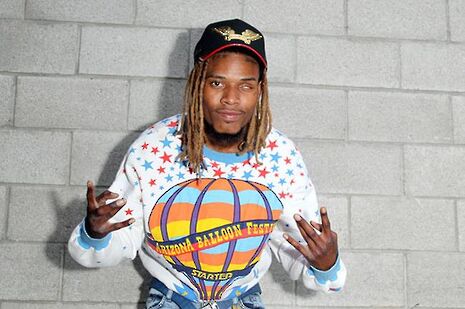Music: Fetty Wap – Fetty Wap
Henry Goodwin believes the album Fetty Wap could “be so much more”

Fetty Wap is the artist who sung ‘Trap Queen’. For many, this is all Fetty Wap will ever be.
In light of this, there was always a chance that the recent release of Fetty Wap’s self-titled debut album would be viewed as avoidable. Why listen to a twenty-track record when you can listen over and over to ‘Trap Queen’ describe “cooking pies in the kitchen with my baby”? Thankfully, this is not the case. Fetty Wap is a strong debut album, packed with songs that have genuine potential to be hits.
Fetty Wap the artist is in many ways the embodiment of the current state of American hip-hop. Sonically it is very easy for the listener to trace the influences that have inspired the album, with nods to the emotional earnestness of Drake and Kanye West’s expressive embrace of autotune on 808s & Heartbreaks. Despite hailing from New Jersey, the impact of Southern artists like Gucci Mane and Young Thug is palpable throughout. Fetty Wap feels like an album that is tapping into a sound to which America is incredibly receptive at the moment; as shown by the roaring success of Future, trap music is becoming an integral aspect of American pop music.
However Fetty Wap still remains difficult to categorize; I suppose that isn’t surprising for a man who shunned a prosthetic eye in the name of individuality. Described by many as a rapper, he is really more of a rap-pop crossover. Returning to ‘Trap Queen’, this was undoubtedly the song of the summer. It was everywhere, blaring out in every club, bar, bedroom and car, reaching number two on the Billboard charts and earning him a place on Taylor Swift’s star-studded ‘1989’ tour. ‘Trap Queen’ starts Fetty Wap off with a bang, and the song is truly representative of the artist’s greatest strengths and weaknesses. The hook is utterly contagious and uniquely his, but Fetty’s attempts at actual rapping are clumsy and ineffective. It’s no surprise that he leaves the majority of the rapping to fellow ‘Remy Boy’ Monty on no fewer than nine tracks.
‘679’ is another album highlight; its menacing, metronomic production perfectly complements Wap’s heartfelt singing. More of the same comes on ‘Jugg’ and ‘My Way’ – there is no doubt that Fetty Wap has found a solid formula for commercial success which he milks throughout, and it includes Monty as a featured artist. A personal favourite is ‘RGF Island’, a track which is essentially a three-minute hook and showcases all of Fetty Wap’s best qualities. Given time, it would be no surprise if ‘RGF Island’ usurped ‘Trap Queen’ as the album’s signature song.
For all that is good in it, the album is not without imperfections. While the ability to create an excellent pop-rap hook is commendable, it does lead to some stretches becoming repetitive. Still it would be wrong to view this as an album in the traditional sense; this is a collection of singles, some of which have already tasted success, others which are surely destined for it. Ultimately, there is a strong chance that Fetty Wap will always be remembered as the artist that sung ‘Trap Queen’. This album proves that he could be so much more.
 Interviews / ‘People just walk away’: the sense of exclusion felt by foundation year students19 April 2024
Interviews / ‘People just walk away’: the sense of exclusion felt by foundation year students19 April 2024 News / Copycat don caught again19 April 2024
News / Copycat don caught again19 April 2024 News / AMES Faculty accused of ‘toxicity’ as dropout and transfer rates remain high 19 April 2024
News / AMES Faculty accused of ‘toxicity’ as dropout and transfer rates remain high 19 April 2024 Theatre / The closest Cambridge comes to a Drama degree 19 April 2024
Theatre / The closest Cambridge comes to a Drama degree 19 April 2024 News / Acting vice-chancellor paid £234,000 for nine month stint19 April 2024
News / Acting vice-chancellor paid £234,000 for nine month stint19 April 2024





